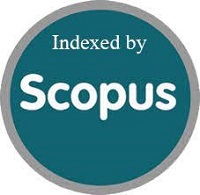Religious Tolerance Measurement: Validity Test in Indonesia
DOI:
https://doi.org/10.15408/jp3i.v10i1.16482Keywords:
religious tolerance, construct validity, religious tolerance scaleAbstract
This study aims to determine the construct validity of items in the religious tolerance scale constructed by Witenberg (2007). There are three aspects or dimensions of religious tolerance used in this scale: fairness, empathy, and reasonableness. This study examines the religious tolerance scale, particularly in Indonesia, using a psychological perspective. The sample is 360 students of Syarif Hidayatullah State Islamic University of Jakarta. The samples use non-probability sampling with a purposive sampling technique. This study uses Confirmatory Factor Analysis (CFA) method and analyzed by software Lisrel 8.7. The results show that the religious tolerance model has a model fit, and this scale is unidimensional. From 30 items, item 12 of the fairness dimension is not valid.References
Allport, G. W. (1954). The nature of prejudice. Wesley Publishing Company. https://archive.org/details/TheNatureOfPrejudice/page/n1
Allport, G. W., & Ross, J. M. (1967). Personal religious orientation and prejudice. Journal of Personality and Social Psychology, 5(4), 432–443. https://psycnet.apa.org/record/2005-11100-004
Amindoni, A. (2019). “Api dalam sekam” konflik aceh singkil: “Kita umat Kristen di sini merasa terombang-ambing.” BBC. https://www.bbc.com/indonesia/indonesia-50471436
Batool, M., & Akram, B. (2020). Development and validation of religious tolerance scale for youth. Journal of Religion and Health, 59(3), 1481–1493. https://doi.org/10.1007/s10943-019-00897-5
BBC. (2019). Dua dekade setelah bom Natal di Mojokerto: “Kami cuma cari kebaikan.” BBC. https://www.bbc.com/indonesia/indonesia-50900289
Browne, M. W., & Cudeck, R. (1992). Alternative ways of assessing model fit. Sociological Methods & Research, 21(2), 230–258. https://doi.org/10.1177/0049124192021002005
Chong, D. (1994). Tolerance and social adjusment to new norms and practice. Political Behavior, 16(1), 21–53. https://link.springer.com/article/10.1007/BF01541641
Clogg, C. C., & Bollen, K. A. (1991). Structural equations with latent variables. In Contemporary Sociology (Vol. 20, Issue 1). https://doi.org/10.2307/2072165
Dhika, M. (2015). Big five terhadap tolerasi beragama pada anggota Front Pembela Islam (FPI). Skripsi UIN Jakarta. http://repository.uinjkt.ac.id/dspace/handle/123456789/37541
Fahmi, I. (2018). Drone emprit academic: software for social media monitoring and analytics. http://dea.uii.ac.id.
Gawali, G. S., & Khattar, T. (2016). The influence of multicultural personality on attitude towards religious diversity among youth. Journal of the Indian Academy of Applied Psychology, 42(June), 114–123.
Idris, F. N. (2015). Memetakan narasi islamisme di Medan, Sumatera Utara: Investigasi terhadap pola penyebaran dan penerimaan terhadap radikalisme. Jurnal Ilmu Politik Dan Komunikasi, V(2). https://badge.dimensions.ai/details/doi/10.34010/jipsi.v5i2.224?domain=https://ojs.unikom.ac.id
Jöreskog, K. G., & Sörbom, D. (1993). Structural equation modeling with the simplis command language.
Kementerian Agama RI. (2010). Toleransi beragama mahasiswa (studi tentang pengaruh kepribadian, keterlibatan organisasi, hasil belajar pendidikan agama, dan lingkungan pendidikan terhadap toleransi mahasiswa berbeda agama pada 7 perguruan tinggi umum negeri) (Bahari (ed.)). Badan Litbang dan Diklat Kementerian Agama.
Korol, L. (2018). Does multicultural personality moderate the relationship between cross-group friendship and allophilia? Journal of Social Psychology, 159(6), 649–663. https://doi.org/10.1080/00224545.2018.1549012
Korol, L. D. (2017). Is the association between multicultural personality and ethnic tolerance explained by cross-group friendship? Journal of General Psychology, 144(4), 264–282. https://doi.org/10.1080/00221309.2017.1374118
Korol, L. D., & Cabral, G. G. M. (2016). The influence of multicultural personality on attitude towards. Psicologia: Teoria e Pratica, 18(2), 57–74.
O’Connor, A. (2017). The nature of prejudice. The Nature of Prejudice. https://doi.org/10.4324/9781912282401
PDSPK Kemdikbud RI. (2017). Analisis sikap toleransi di indonesia dan faktor-faktornya.
PPIM UIN Jakarta. (2018a). Api dalam sekam: keberagamaan generasi Z. Convey Report, 1(1). https://conveyindonesia.com/publication/convey-report/
PPIM UIN Jakarta. (2018b). Sikap dan perilaku keberagamaan guru dan dosen pendidikan agama islam. Convey Report, 1(9). https://conveyindonesia.com/publication/convey-report/
Puspita, R. (2020). Menag: kasus perusakan tempat ibadah sangat kecil. Republika. https://republika.co.id/berita/q4xj3k428/menag-kasus-perusakan-tempat-ibadah-sangat-kecil
Sullivan, J. L., & Transue, J. E. (1999). The psychological underoinnings of democracy: a selective review of research on political tolerance , interpersonal trust , and social capital. Annual Review of Psychology, 50, 625–651.
Supriyanto. (2017). Memahami dan mengukur toleransi dari perspektif psikologi sosial. Psikoislamika, 15(September), 16–17.
Umar, J. (2011). Perkuliahan statistika psikologi UIN Jakarta.
Umar, J., & Nisa, Y. F. (2020). Uji validitas konstruk dengan CFA dan pelaporannya. Jurnal Pengukuran Psikologi dan Pendidikan Indonesia, 9(2), 1–11. http://journal.uinjkt.ac.id/index.php/jp3i/article/view/16964
Verkuyten, M., & Yogeeswaran, K. (2016). The social psychology of intergroup toleration : a roadmap for theory and research. Personality and Social Psychology Review, 1–25. https://doi.org/10.1177/1088868316640974
Wahid Foundation. (2016). Potensi intoleransi dan radikalisme sosial-keagamaan di kalangan muslim Indonesia. Wahid Institute.
Walt, J. L. Van Der. (2014). Measuring religious tolerance in education. Review of Education, Pedagogy and Cultural Studies. http://www.driestar-educatief.nl/medialibrary/Driestar/Engelse-website/Documenten/2014-VanderWalt-Measuring-religious-tolerance-in-education.pdf
Witenberg, R. T. (2004). Subordination of racial tolerance to freedom of speech : Some considerations for education in contemporary multicultural societies. Australian Psychologist, 39(May), 114–117. https://doi.org/10.1080/00050060410001701825
Witenberg, R. T. (2007). The moral dimension of children ’ s and adolescents ’ conceptualisation of tolerance to human diversity. Journal of Moral Education, January 2015, 37–41. https://doi.org/10.1080/03057240701688002
Witenberg, R. T. (2019). The psychology of tolerance conception and development. Springer.
Zee, K. I. Van Der, & Oudenhoven, J. P. Van. (2001). The multicultural personality questionnaire: reliability and validity of self- and other ratings of multicultural effectiveness Karen I. Van der Zee and Jan Pieter Van Oudenhoven. Journal of Research in Personality, 288, 278–288. https://doi.org/10.1006/jrpe.2001.2320
Zee, K. Van Der, Oudenhoven, J. P. Van, Ponterotto, J. G., & Alexander, W. (2013). Multicultural personality questionnaire : development of a short form multicultural personality questionnaire : development of a short form. Journal of Personality Assessment, 95(1), 37–41. https://doi.org/10.1080/00223891.2012.718302



